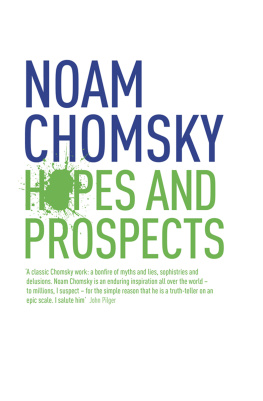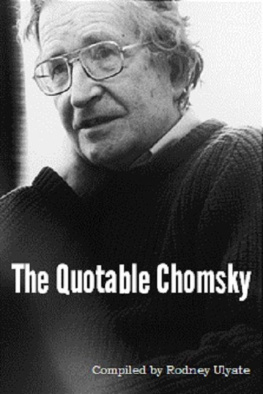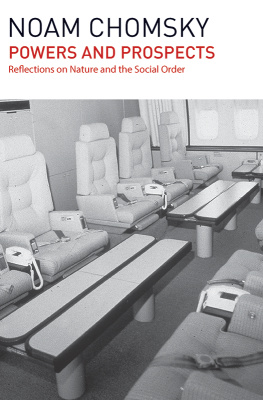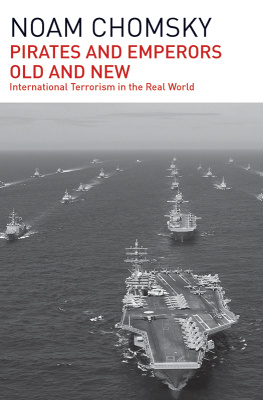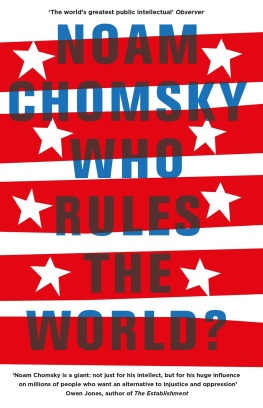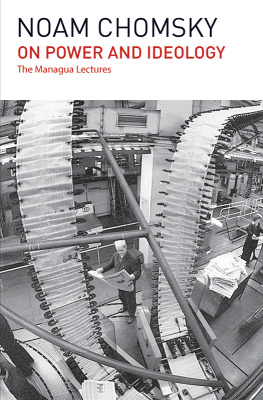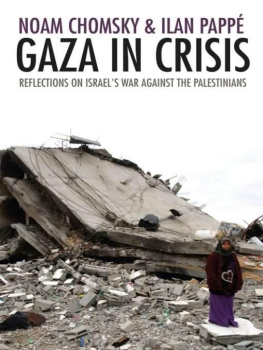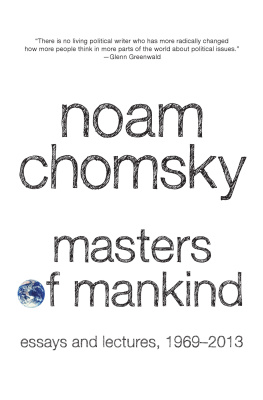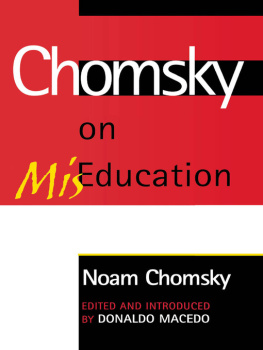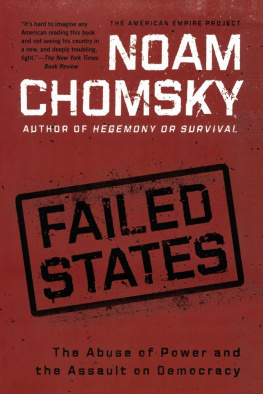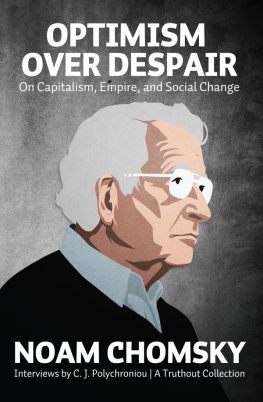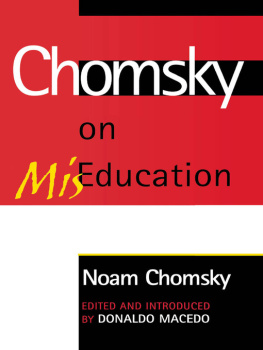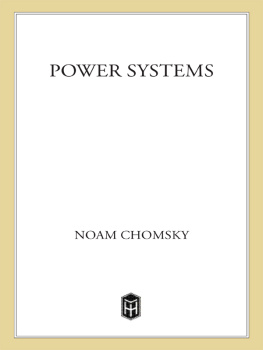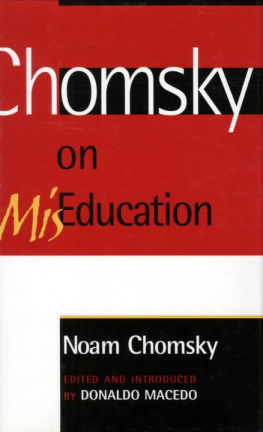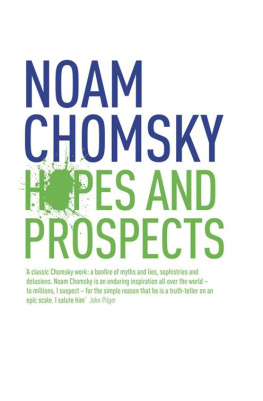Hopes and Prospects
Noam Chomsky

HAMISH HAMILTON
an imprint of
PENGUIN BOOKS
HAMISH HAMILTON
Published by the Penguin Group
Penguin Books Ltd, 80 Strand, London WC2R 0RL , England
Penguin Group (USA) Inc., 375 Hudson Street, New York, NewYork 10014, USA
Penguin Group (Canada), 90 Eglinton Avenue East, Suite 700,Toronto, Ontario, Canada M4P 2Y3 (a division of PearsonPenguin Canada Inc.)
Penguin Ireland, 25 St Stephens Green, Dublin 2,Ireland (a division of Penguin Books Ltd)
Penguin Group (Australia), 250 Camberwell Road, Camberwell,Victoria 3124, Australia (a division of Pearson Australia Group Pty Ltd)
Penguin Books India Pvt Ltd, 11 Community Centre, PanchsheelPark, New Delhi 110 017, India
Penguin Group (NZ), 67 Apollo Drive, Rosedale, North Shore0632, New Zealand (a division of Pearson New Zealand Ltd)
Penguin Books (South Africa) (Pty) Ltd, 24 Sturdee Avenue,Rosebank, Johannesburg 2196, South Africa
Penguin Books Ltd, Registered Offices: 80 Strand, London WC2R 0RL , England
www.penguin.com
First published in the USA by Haymarket Books 2010
First published in Great Britain by Hamish Hamilton 2010
Copyright Noam Chomsky, 2010
The moral right of the author has been asserted
All rights reserved
Without limiting the rights under copyright reserved above,no part of this publication may be reproduced, stored in or introduced into a retrievalsystem, or transmitted, in any form or by any means (electronic, mechanical,photocopying, recording or otherwise), without the prior written permission of both thecopyright owner and the above publisher of this book
A CIP catalogue record for this book is available from theBritish Library
ISBN: 978-0-241-14476-3
Preface
The essays collected here had their origin in a series oflectures in Chile in October 2006, published in Spanish in 2009 by EDUFRO Universidad dela Frontera (Temuco) with the title Neoliberalismo yGlobalizacin . I had intended to prepare them for publication inEnglish, but was unable to do so for some time. They appear here as the first threechapters, updated to early 2010 and considerably expanded. is Latin America and U.S. relationswith the subcontinent.
draws on talks in October toNovember 2009, in the United Kingdom and Ireland, and at Boston College (November 30), acommemoration of the assassinations of November 16, 1989.
PART I
Latin America
ONE
Year 514: Globalization for Whom?
Human affairs proceed in their intricate, endlessly varied,and unpredictable paths, but occasionally events occur that are taken to be sharpturning points in history. There have been several in recent years. It is a nearplatitude in the West that after September 11, 2001, nothing will be the same. The fallof the Berlin wall in 1989 was another event accorded this high status. There is a greatdeal to say about these two cases, both the myth and the reality. But in referring tothe 514th year I of course have something different in mind: the year 1492, which did,undoubtedly, direct world history on a radically new course, with awesome and lastingconsequences.
As we know, the voyages of Columbus opened the way to the Europeanconquest of the Western hemisphere, with hideous consequences for the indigenouspopulation, and soon for Africans brought here in one of the vilest episodes of history.Vasco da Gama soon opened the way to bring to Africa and Asia the the savageinjustice of the Europeans, to borrow Adam Smiths rueful phrase, referringprimarily to Britains terrible crimes in India, plain enough even in his day.Also in 1492, Christian conquerors extended their barbaric sway over the most advancedand tolerant civilization in Europe, Moorish Spain, forcing Jews to flee or convert tothe civilization of the Inquisition and initiating the vast ethnic cleansing of theMuslim population (Moors), while also destroying much of the The conquest of most ofthe world by Europe and its offshoots has been the primary theme of world history eversince.
The basic reasons for Europes remarkable military successes arewell understood. One was European filth, which caused epidemics that decimated the muchhealthier populations of the Western hemisphere.and looming not too far in the distance is the threat ofanthropogenic environmental catastrophe.
Todays gap between North and Souththe rich developedsocieties and the rest of the worldwas largely created by the global conquest.Scholarship and science are beginning to recognize a record that had been concealed byimperial arrogance. They are discovering that at the time of the arrival of theEuropeans, and long before, the Western hemisphere was home to some of the worldsmost advanced civilizations. In the poorest country of South America, archaeologists arecoming to believe that eastern Bolivia was the site of a wealthy, sophisticated, andcomplex society of perhaps a million people. In their words, it was the site ofone of the largest, strangest, and most ecologically rich artificial environmentson the face of the planet, with causeways and canals, spacious and formal towns and
One of the most exciting developments of the past few decades is therevival of indigenous cultures and languages, and the struggles for community andpolitical rights. The achievements in South America have been particularly dramatic.Throughout the hemisphere and elsewhere there are indigenous movements seeking to gainland rights and other civil and human rights that have been denied them by repressiveand often murderous states. This is happening even where the indigenous communitiesbarely survived the conquest, as in the United States, where the pre-contact populationof perhaps seven million or more was reduced to a few hundred thousand by 1900. I needhardly mention that the issues are very much alive right here in Temuco, at the frontierwith the Mapuche.
My own department at MIT has played a significant role in the revival,thanks to the extraordinary work of the late Kenneth Hale. Apart from working on humanrights issues for indigenous populations in the Americas and Australia, and fundamentalcontributions to the study of their languages and to linguistic theory, he also broughtpeople from reservations who had had few educational opportunities and devoted greateffort to helping them gain doctoral degrees in a very demanding program, withdissertations on their own languages that surpassed anything in the literature in depthand sophistication. They returned to their homes, and have established educational andcultural programs, several of which have flourished, revitalizing marginalizedcommunities and helping them to gain broader rights. I will mention only one reallyspectacular achievement. One of the major languages of New England before the conquestwas Wampanoag. The people themselves were mostly expelled or murdered, with a bountyoffered for their heads, while those who surrendered and did not want to fight were soldinto slaverymen, women, and childrenby the early English colonists.reconstruct the language from textual and comparative evidence. Hales primarycollaborator was a Wampanoag woman, Jesse Little Doe, who helped reconstruct thelanguage and then learned it. At a memorial for Hale, she paid her tribute to him influent Wampanoag, and also brought her two-year-old daughter, the first native speakerof the language in a century. There is a good chance that the culture and community willflourish and find a proper place in the larger society, a model for what might beachieved elsewhere.
On the other side of the world, at the time of the European conquests,China and India were the worlds major commercial and industrial centers, wellahead of Europe in public health and probably sophistication and scale of market systemsand trading areas. Life expectancy in Japan may have been higher than in Europe. England was trying tocatch up in textiles and other manufactures, borrowing from India and other countries inways that are now called piracy, and are banned in the international tradeagreements imposed by the rich states under a cynical pretense of freetrade.

